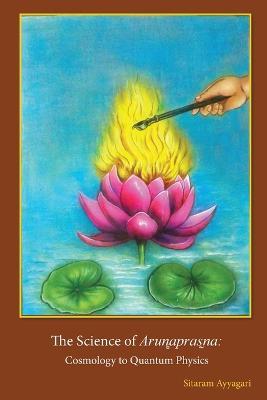The Science of Arun̻apras̰na: Cosmology to Quantum Physics

The Science of Arun̻apras̰na: Cosmology to Quantum Physics
In R̰gved̾a 10.158 Su͆kt̾a, R̰s͚i Caks͚u So̾rya beseeches Su͆rya D̾evat̾a͆ for eyes to correctly see and understand our world. There is no doubt we need that kind of clarity for understanding our beautiful yet bewildering universe, especially when we as observers are interacting intimately with what we are observing. Scientists understand this complexity and are continuously attempting to internalize the external variables in their models, but there is still a vast ground to cover. Like the scientists, Mi͆ma͆˙saka͆s are firmly grounded in physical reality. They do accept the science's Prat̾yaks͚a and Anuma͆na, but when it comes to D̰̾arma, they rely only on their solid exegesis of the Ved̾a and embody it through Ved̾a's mandated ritualistic way of life. In fact, in the discussion on Apu͆rva, the Mi͆ma͆˙saka͆s say that only when Prat̾yaks͚a and Anuma͆na do not show a physical benefit of an action enjoined by the Ved̾a should one ascribe that to Apu͆rva. In this interesting succinct work of practical significance, the author outlines the science of the Ved̾a along those lines. It is essential to note the preposition "of" in the title of the book. The title is "The Science of Arun̻apras̰na: " and not "The Science in Arun̻apras̰na: ." This is not just the view of the Mi͆ma͆˙saka͆s alone. World over most ethnic-religious systems embody this perspective in their own unique way. Deist, nature worshipper, and the father of the American independence movement, Thomas Paine, in one of his most famous works, "The Age of Reason" said, "It is from the study of the true theology that all our knowledge of science is derived, and it is from that knowledge that all the arts have originated." The author's goal in this work is to foster collaboration amongst the Mi͆ma͆˙saka͆s, other Ved̾a scholars, scientists, and engineers to understand the science of Ved̾a for everyone's benefit. In fact, the subject matter is such that it demands this kind of cooperation. It is helpful in this context to quote Ra͆ja͆ R̰t̾uparn̻a, from Maha͆b̰a͆rat̾a 3.7.72.8. R̰t̾uparn̻a, before demonstrating his statistical estimation skills says to Ba͆huka his charioteer, who is none other than great
PRP: 294.50 Lei
Acesta este Prețul Recomandat de Producător. Prețul de vânzare al produsului este afișat mai jos.
235.60Lei
235.60Lei
294.50 LeiLivrare in 2-4 saptamani
Descrierea produsului
In R̰gved̾a 10.158 Su͆kt̾a, R̰s͚i Caks͚u So̾rya beseeches Su͆rya D̾evat̾a͆ for eyes to correctly see and understand our world. There is no doubt we need that kind of clarity for understanding our beautiful yet bewildering universe, especially when we as observers are interacting intimately with what we are observing. Scientists understand this complexity and are continuously attempting to internalize the external variables in their models, but there is still a vast ground to cover. Like the scientists, Mi͆ma͆˙saka͆s are firmly grounded in physical reality. They do accept the science's Prat̾yaks͚a and Anuma͆na, but when it comes to D̰̾arma, they rely only on their solid exegesis of the Ved̾a and embody it through Ved̾a's mandated ritualistic way of life. In fact, in the discussion on Apu͆rva, the Mi͆ma͆˙saka͆s say that only when Prat̾yaks͚a and Anuma͆na do not show a physical benefit of an action enjoined by the Ved̾a should one ascribe that to Apu͆rva. In this interesting succinct work of practical significance, the author outlines the science of the Ved̾a along those lines. It is essential to note the preposition "of" in the title of the book. The title is "The Science of Arun̻apras̰na: " and not "The Science in Arun̻apras̰na: ." This is not just the view of the Mi͆ma͆˙saka͆s alone. World over most ethnic-religious systems embody this perspective in their own unique way. Deist, nature worshipper, and the father of the American independence movement, Thomas Paine, in one of his most famous works, "The Age of Reason" said, "It is from the study of the true theology that all our knowledge of science is derived, and it is from that knowledge that all the arts have originated." The author's goal in this work is to foster collaboration amongst the Mi͆ma͆˙saka͆s, other Ved̾a scholars, scientists, and engineers to understand the science of Ved̾a for everyone's benefit. In fact, the subject matter is such that it demands this kind of cooperation. It is helpful in this context to quote Ra͆ja͆ R̰t̾uparn̻a, from Maha͆b̰a͆rat̾a 3.7.72.8. R̰t̾uparn̻a, before demonstrating his statistical estimation skills says to Ba͆huka his charioteer, who is none other than great
Detaliile produsului










